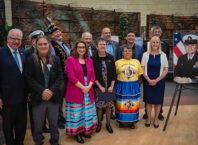Drummer awarded for philanthropic work
Tiwahe Foundation President and CEO,
Kelly Drummer was awarded the Louis T. Delgado Distinguished
Grantmaker Award at the Native Americans in Philanthropy’s 25th
Anniversary Celebration – 2015 Native Philanthropy Institute at
Mystic Lake Casino Hotel in Prior Lake, MN on May 6.
Kelly Drummer (Oglala Lakota) has over
17 years of experience working with both nonprofit organizations and
community foundations. Prior to joining the Tiwahe Foundation, she
served as the director of development and communications at New
Foundations, a supportive housing community in St. Paul. She began
her involvement with the Tiwahe Foundation in 2007 and previously
served as its Board Chair. In this capacity, she helped lead the
foundation through a strategic planning and branding process.
Drummer holds a Masters in
Philanthropy and Development from St. Mary’s University and her
B.A. from the University of Minnesota in cultural anthropology. She
served as a mentor to young Native leaders throughout the past 20
years and has a particular interest in engaging Native leaders in
fundraising and philanthropy.
Louis T. Delgado Distinguished Grantmaker Award represents Kelly
Drummer and her work in the philanthropic sector. She continues to be
a bridge for the Native American community and mainstream
philanthropy. Drummer is a member of the first cohort (2006-2007) of
the Circle of Leaders Program at Native Americans in Philanthropy.
The nominee for the Louis T. Delgado
Distinguished Grantmaker Award must fulfill the criteria of
understanding and advancing the role of philanthropy between Native
communities and mainstream philanthropy.
The Tiwahe Foundation is an
independent; American Indian led community foundation that provides
permanency for the American Indian Family Empowerment Program Fund
(AIFEP) and leadership development initiatives.
The Bush Foundation announces its 2015
Community Innovation Grantees
30 organizations will receive nearly $5
million through the Bush Foundation’s 2015 Community Innovation Grant
program. Funds support problem-solving efforts across a range of
issue areas including domestic violence prevention, food sovereignty
and watershed preservation.
“This year’s Community Innovation
Grant recipients represent a growing network of organizations that
are truly advocating for social change. It’s impressive to see the
depth and breadth of thoughtful and responsive processes these
organizations have proposed, and I know the Foundation is pleased to
support such collaborative work,” Molly Matheson Gruen, Bush
Foundation Community Innovation Director said.
The Community Innovation Grant program
was established in 2013 for community stakeholders to find
breakthrough solutions to complex challenges. Projects receiving
Community Innovation Grant support will inspire collaborative
problem-solving processes that lead to more effective, equitable and
sustainable solutions.
The following tribal and Native
American organizations were awarded a community innovation grant.
White Earth Land Recovery Project,
Callaway, Minn., will focus on strengthening resources, education and
support in seed stewardship practices by developing a regional
Indigenous Seed Keepers Network. Seed keeping is an essential yet
overlooked aspect of a decolonized food system, and the Network will
equip new and existing Native seed keepers with the knowledge they
need to save, breed and exchange their own seeds. The project
received $200,000 for a 37-month term.
The Native American Advocacy Program,
Herrick, S.D., established the Mato Tasunka Wakinyan Okolakiciye
(Bear Horse Thunder Youth Society) to promote Lakota culture to youth
on the Rosebud Sioux Reservation. Selected members of the
youth-driven Society will learn about cultural tourism, beekeeping
and medicinal herbs social enterprises through an 18-month
apprenticeship. The organization received $162,283 for a 19-month
term.
The Wanbli Wiconi Tipi Rosebud Sioux
Detention Center, Rosebud, S.D., will examine the intersections
between healthy eating, job skills training and at-risk youth
development by developing a business plan model for a youth-run
hydroponic farm. The Work 2 Wellness initiative hopes to improve
Tribal health practices, stimulate the local economy and give
disadvantaged youth an opportunity to learn about farming. The
detention center received $198,076 for a 13-month term.
On Pine Ridge, 30 percent of people
are practicing artists and 40 percent of households rely on
traditional arts for income. However, most of the artists live in
poverty, are isolated from opportunities to promote their art and
cannot afford to travel. Known for its dedication to fostering the
artist community and the economic development of Pine Ridge, First
Peoples Fund will organize an operational plan to introduce a
fully-equipped mobile arts unit that will support artists across the
reservation. The organization received $200,000 for a 13-month term.






